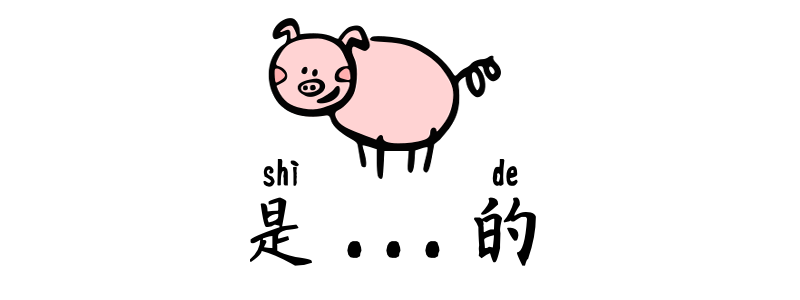Grammar Point:
The 是 shì … 的 de structure is used in Chinese to provide emphasis on specific details of a past action or event. It is used to draw attention to the time, place, manner, or other specific details of an action or event, and to give additional information or explanation. This structure is useful in answering questions or providing more detail in conversation.
When to use it?
- Explain a situation by emphasizing a particular detail
- Correct a certain piece of information
- Seek specific information
What do I need to know?
- It is usually used to emphasize the past event.
- Both the listener and the speaker know objects, which is why people tend to drop the object in this structure.
- To negate this structure, always place 不 bù before 是 shì, not the verb.
- In this structure, the use of 是 shì is mostly optional. The only time when 是 shì is necessary in this construction is when negating it. Apart from that, it is often left out.
- For questions, you can either place 吗 ma at the end or use 是不是 shìbúshì to replace 是 shì.
Structure
S + 是 + thing to be emphasized + Verb + 的
The object can either be placed before or after 的 de, or even dropped altogether in this structure.
| Subject | 是 shì | time/place/manner/specific detail | V(O) | 的 de | (O) |
|---|---|---|---|---|---|
| 我 wǒ | 是 shì | 昨天 zuótiān (It was yesterday that I drank the coffee.) | 喝 hē | 的 de | 咖啡 kāfēi |
| 我 wǒ | 是 shì | 在那家咖啡店 zài nàjiā kāfēidiàn (I was at that cafe drinking coffee.) | 喝 hē | 的 de | 咖啡 kāfēi |
| 我 wǒ | 是 shì | 走路去 zǒulù qù (I was walking to there to drink coffee.) | 喝 hē | 的 de | 咖啡 kāfēi |
| 我 wǒ | 是 shì | 跟弟弟 gēn dìdi (It was my brother, whom I drank coffee with.) | 喝 hē | 的 de | 咖啡 kāfēi |
| Object | 是 shì | Subject | V | 的 de |
|---|---|---|---|---|
| 咖啡 kāfēi | 是 shì | 我 wǒ (It was me! I drank the coffee.) | 喝 hē | 的 de |
Explain a situation by emphasizing a particular detail
不要看我,那是你弟弟弄壞的,不是我弄壞的不要看我,那是你弟弟弄坏的,不是我弄坏的
Don’t look at me, It was your brother’s fault, not mine.
A:為什麼家裡會有新的PS5?A:为什么家里会有新的PS5?
A: Why do we have the new PS5 at home?
B:(是)朋友送我的,不是我買的!B:(是)朋友送我的,不是我买的!
B: It was a friend gave it to me. I didn’t buy it!
桌上的咖啡不要喝,那是昨天煮的桌上的咖啡不要喝,那是昨天煮的
Don’t drink the coffee on the table, it was made yesterday.
Correct a certain piece of information
A:你中文這麽好,一定來台灣很久了!A:你中文这麽好,一定来台湾很久了!
A: You speak Chinese so well, you must have been in Taiwan for a long time!
B:呃···其實我是兩天前來的B:呃···其实我是两天前来的
B: Uh… actually, It was two days ago when I came here”
A:你說你家在英格蘭的哪裡?A:你说你家在英格兰的哪里?
A: Where in England did you say your home was?
B:我(是)從蘇格蘭來的!B:我(是)从苏格兰来的!
B: I am from Scotland!
A:你這次要跟男朋友一起去韓國玩幾天?A:你这次要跟男朋友一起去韩国玩几天?
A: How many days are you going to Korea with your boyfriend this time?
B:5天,不過我這次(是)一個人去的!B:5天,不过我这次(是)一个人去的!
B: 5 days, but I’m going alone this time!
Seek specific information
你中文是在哪裡學的?你中文是在哪里学的?
Where did you learn Chinese?
你(是)怎麼知道的?你(是)怎么知道的?
How did you know that?
是不是王先生跟你說的?是不是王先生跟你说的?
Was it Mr. Wang who told you that?
Where to place the object
Although I mentioned that there is no difference between placing the object before or after 的 de, that’s not entirely true. It can still cause confusion in some sentences, where it may seem like the subject is the object, rather than emphasizing something else in the sentence. For example:
他是昨天買的豬他是昨天买的猪
This sentence can be translated as “It was yesterday when he bought a pig” or “He is the pig that was bought yesterday.”🥴
Let’s try another way, this time by placing the object before 的 de.
他是昨天買豬的他是昨天买猪的
Now, this sentence can be translated as “It was yesterday when he bought a pig” or “He was the person who bought the pig yesterday.”
So what can we do about this issue? Well, unfortunately, there isn’t much we can do, even native speakers can make this mistake, so don’t worry too much about it. Just say what you mean and people will understand, even if they tease you a little bit!
了 le vs 是 shì…的 de
你什麼時候來台灣了?你什么时候来台湾了?
This sentence means “When did you come to Taiwan?” and implies that the speaker is a little surprised that the person has already been to Taiwan. Therefore, you wouldn’t use this sentence to ask a foreigner who speaks good Chinese because you would not expect that this foreigner is currently in Taiwan.
你什麼時候來了台灣?你什么时候来了台湾?
This sentence means “When did you come to Taiwan?” and implies that the speaker knows that the person has already left Taiwan.
你是什麼時候來台灣的?你是什么时候来台湾的?
This sentence means “When did you come to Taiwan?” It suggests that the speaker is interested in the specific time of the person’s arrival in Taiwan. This structure is commonly used when couples ask each other about their whereabouts or when police officers question suspects.
If you are still not clear on how to use the 了 le, I suggest you read the following articles:
- 了 Part 1 (HSK 1)
- 了 Part 2 (HSK 2)


